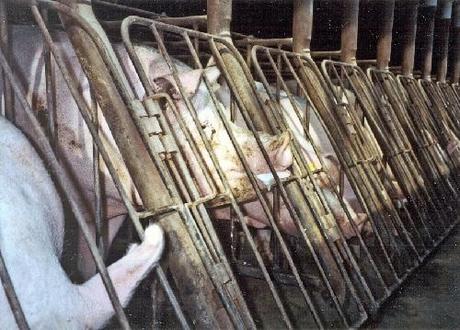 GarryRogers: Kaufmann writes about both cruelty to farmed animals and the danger to human consumers. He cites the common resistance to inconvenient facts as an important cause of animal neglect. He points out that the emotional impact of widespread cruelty to animals undermines efforts to harmonize human behavior with nature in matters such as climate change. I would add that there is also a great deal of simple ignorance at work. The ignorance is due to resistance to inconvenient facts, and it is due to simple lack of information. Most people today do not understand that animals are essential elements of Earth ecosystems upon which we humans depend for survival. Acquiring this understanding leads to that most pragmatic of philosophies “The Land Ethic” (Leopold 1949). It also leads to respect for animals and their natural homes, leaving no room for animal cruelty and farming practices that produce harmful food products.
GarryRogers: Kaufmann writes about both cruelty to farmed animals and the danger to human consumers. He cites the common resistance to inconvenient facts as an important cause of animal neglect. He points out that the emotional impact of widespread cruelty to animals undermines efforts to harmonize human behavior with nature in matters such as climate change. I would add that there is also a great deal of simple ignorance at work. The ignorance is due to resistance to inconvenient facts, and it is due to simple lack of information. Most people today do not understand that animals are essential elements of Earth ecosystems upon which we humans depend for survival. Acquiring this understanding leads to that most pragmatic of philosophies “The Land Ethic” (Leopold 1949). It also leads to respect for animals and their natural homes, leaving no room for animal cruelty and farming practices that produce harmful food products.
Article By Stephen Kaufman, OpEdNews. “I want to focus on some more insidious and pernicious ways that harming animals in turn harms humans. The spirit of truth is among the first casualties. Those who mistreat nonhumans do their best to hide the facts. For example, seven states have passed “ag-gag” laws that make it a crime for people to photograph or videotape animal treatment in factory farms. That’s because, in addition to documenting widespread criminal cruelty to animals, undercover investigations have shown that “standard animal husbandry practices” (which are exempt from animal cruelty laws throughout the United States) involve systematic, institutionalized abuse of billions of farmed animals each year.

“Factory farmed animals experience unrelenting pain and misery from birth to death. (See, for example, www.mercyforanimals.org or “Meet Your Meat“. Even the small fraction of animals raised “humanely” still routinely suffer mutilations without pain relief, deprivation of many natural needs and desires, and violence and terror associated with transportation to and death in slaughterhouses.” Read more.

